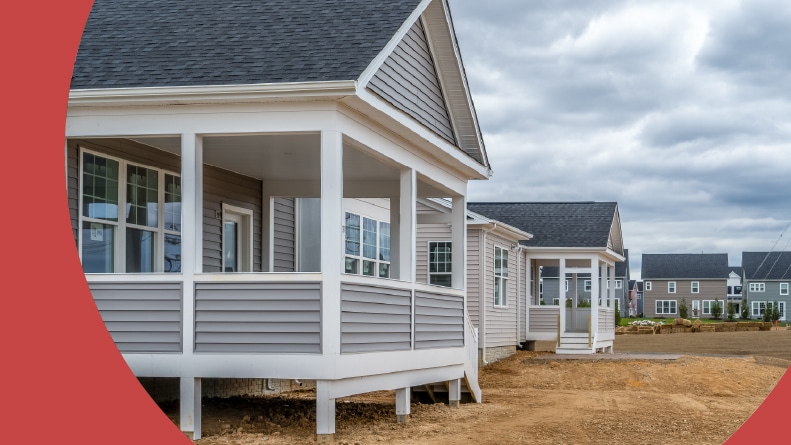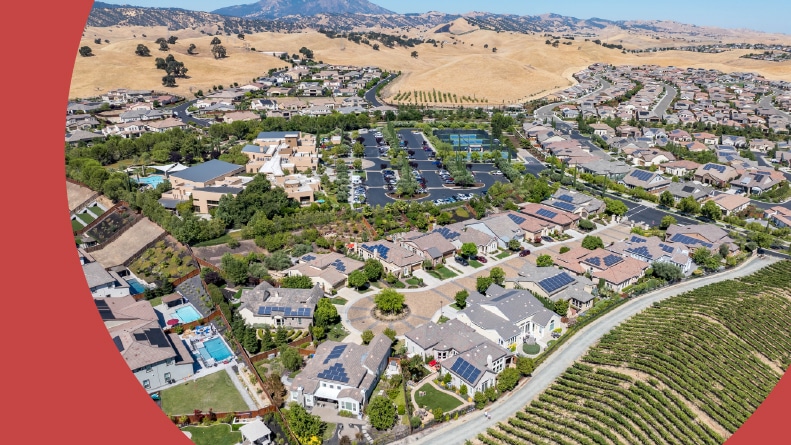Are 55+ communities legal? It’s a question many homebuyers ask when considering an age-restricted community. Yes, 55+ communities are completely legal! Thanks to specific exemptions under federal and state laws, these communities can offer a lifestyle tailored to active adults.
But with laws in place to prevent housing discrimination, how do these communities legally enforce age limits? In this article, we’ll break down the legal framework that makes them possible, how they operate, and the benefits they provide for those seeking a vibrant, low-maintenance retirement.
Age-Restricted Communities
Every year, an increasing number of active adults decide to move into an age-restricted community. The 55+ community real estate market in the United States continues to grow more than 4% each year, according to a report by Grand View Research.
With thousands of 55+ communities across the country, active adults have ample opportunities to enjoy an active physical and social lifestyle near like-minded individuals. Residents also enjoy a range of benefits such as resort-style amenities, abundant activities, well-designed homes, and low-maintenance lifestyles.
Despite the popularity of active adult communities, some still ask: “How are 55+ communities legal?” Housing laws exist that protect homeowners from discrimination, including age-based discrimination. Because of these laws, several misconceptions surround the legality of age-restricted communities. At worst, misinformation might cause active adults to reconsider their home search.
Fortunately, we compiled this guide to detail the ins and outs of the laws that allow age-restricted communities. Keep reading to equip yourself with important knowledge and research you need to know to enjoy peace of mind in a 55+ community.
The Legal Foundation for Age-Restricted Communities

When people question the legality of age-restricted communities, they usually think of the Fair Housing Act (FHA) of 1968. The FHA created a foundation for laws about housing discrimination. It maintains that housing providers such as real estate companies and landlords cannot discriminate against residents based on factors including race, color, national origin, religion, disability, or familial status. An age restriction falls under the “familial status” category of the FHA.
The FHA features a 1995 amendment titled the Housing for Older Persons Act (HOPA). To make a long story short, HOPA protects and validates the legality of age-restricted communities. HOPA created an exemption for the familial status portion of the FHA. The exemption allows age-restricted communities to enforce a minimum age requirement for residents.
HOPA covers three different types of housing:
- State and federal assisted living facilities for seniors
- 62+ communities
- 55+ communities
55+ communities are the most common type of age-restricted community in the country. Age-restricted communities must meet specific requirements set by the US Department of Housing and Urban Development (HUD) to qualify for the FHA exemption.
How Age-Restricted Communities Meet Legal Requirements

Age-restricted communities must meet three requirements of the HOPA to qualify for legal status. HUD sets these standards to ensure compliance for 55+ communities.
80/20 Rule
The 80/20 rule states that at least 80% of homes in an age-restricted community must be inhabited by at least one 55+ occupant. In other words, 55+ active adults must reside in the majority of homes in the community. The 80/20 rule does not mean that the other 20% of homes must include people under 55. Instead, the rule provides some wiggle room and flexibility in certain situations, such as allowing for spouses or adult children who reside with a 55+ active adult. Keep in mind that there may be a minimum age, usually 40+, for those under 55.
Clear Designation As Age-Restricted
Another requirement includes the community providing clear and public demonstration that it’s age-restricted. Any marketing, advertisements, signs, and internal documents should clearly designate the community as 55+ or age-restricted. The developer must create and enforce clear policies that adhere to guidelines set by HUD.
Verify Ages
To be legally considered an age-restricted community, the final requirement is that the development must verify the ages of its residents. This usually involves something as simple as checking driver’s licenses or birth certificates to ensure that the age minimum is met.
Common Legal Concerns and Myths

Several myths and misconceptions surround the legality of age-restricted communities, leaving many active adults to question whether or not it’s a good idea to consider moving into one. Here are some of the most common concerns when it comes to the legal details of 55+ communities.
“Isn’t this age discrimination?”
No. Due to the Housing for Older Persons Act (HOPA) in the Fair Housing Act (FHA), age-restricted communities are completely legal as long as the community meets the requirements outlined in the law. HOPA provides an exemption to allow those 55+ to live around others who wish to share in the active adult lifestyle.
“Can younger residents live in age-restricted communities?”
Due to the 80/20 rule, residents under 55 can still live in age-restricted communities. At least one 55+ resident must live in 80% of the homes within the community.
Technically, the other 20%of the homes could be occupied by those under 55. However, this is uncommon in communities that advertise themselves as being age-restricted because the neighborhoods attract like-minded homeowners. In most 55+ communities, the vast majority or entirety of residents meet the age restriction.
However, some age-restricted communities have restrictions for children under the age of 18. While extended visits from grandchildren are often allowed frequently, children cannot live at the residence full-time. Interested homebuyers concerned about these rules should carefully consult with a real estate agent to understand the specifics of particular communities.
“What happens if a resident no longer meets the age requirement?”
If a community decides to change its age restriction policy, the new policy applies to new residents moving forward. Any existing residents will be “grandfathered” in and permitted to stay in the community even if they do not meet the age requirement.
For example, say a 55+ community increases its age restriction to 62+. A resident who is 57 is entitled to legally stay in the community. However, any new residents who move in after the policy change will need to meet the new requirements.
Benefits of Age-Restricted Communities

Active adults choose to live in age-restricted communities for many reasons. Importantly, homebuyers seek out the amenities that 55+ communities tend to offer. 55+ communities have earned a well-deserved reputation for providing resort-style amenities, which can include:
- clubhouses
- fitness centers
- resort-style pools
- golf courses
- restaurants
- arts and crafts studios
- movie theaters
Clubs and Social Gatherings
Many age-restricted communities provide lifestyle directors who create busy social calendars for residents to enjoy. Like-minded neighbors can get together throughout the week for activities and events such as interest clubs, group outings, and social gatherings. Homeowners can stay as busy as they please or even start their own clubs or groups to pursue new interests.
55+ Home Designs
Developers of 55+ communities also design homes specifically for the comfort and accessibility of active adults by including features like first-floor owner’s suites, open-concept floor plans, convenient storage, and plenty of room for company. Many age-restricted communities provide a range of home styles and floor plans designed to suit any need or budget.
Like-Minded Neighbors
Perhaps the most crucial benefit of 55+ communities—thanks to the 80/20 rule—is that residents often share the same maturity, interests, and active adult lifestyle as their neighbors. The overall atmosphere differs from one to the other, but age-restricted communities often feel relaxed, quiet, and full of fun and new opportunities to explore. Residents also enjoy a high standard of safety and security, with many communities including fences and manned gates.
Are There Any Downsides?

While 55+ communities offer many benefits, they may not be the right fit for everyone. These communities provide a lifestyle tailored to older adults, but it’s important to weigh these potential drawbacks to determine if they align with your personal preferences and long-term goals.
Limited Age Diversity
One potential downside is the limited age diversity. If you enjoy being around people of all ages, an age-restricted community might feel too uniform, as most residents are in a similar stage of life.
HOA Fees & Rules
Another factor to consider is the presence of homeowners’ associations (HOAs), which often come with monthly fees and strict rules. These regulations may include restrictions on home modifications, landscaping choices, and parking, which could feel restrictive to those who prefer more flexibility.
Resale Limitations
Additionally, resale limitations can be a concern. When it comes time to sell, the pool of potential buyers is smaller, as most must meet the community’s age requirement. This could lead to longer selling times or impact the home’s resale value.
How to Choose an Age-Restricted Community

Choosing the right age-restricted community is a matter of personal preference, need, and taste. Each community has pros and cons, but with so many different options to choose from, homeowners can always find the best fit for them. Individuals should conduct adequate research and speak with trusted financial advisors and real estate professionals to select a community.
Community Size
Consider the most important factors when it comes to choosing a home. Does the size matter? Some age-restricted communities include less than 100 homes with a few select amenities, while others can sprawl over multiple zip codes and include entire town centers within them. Smaller 55+ communities provide a tight-knit feel, while active adults may need to drive golf carts to traverse the biggest age-restricted developments.
HOA Benefits and Restrictions
Another important consideration includes whether or not the community has an HOA. What policies should potential homeowners consider? Active adults should ensure that the HOA complies with HOPA and provides documentation to show the legality of the age-restricted community. Remember that advertising itself as an age-restricted community is not enough to legally qualify a community for the designation. The HOA must enforce it by maintaining the 80/20 population rule and by ensuring age verification for each resident.
Keep in mind that HOAs also enforce a multitude of additional rules and regulations beyond the purview of HOPA requirements. Residents sign a contract that subjects them to the bylaws included in the neighborhood policies, and active adults should take a very close look at those policies before deciding on a community. HOAs can provide a myriad of benefits, such as community upkeep, amenity expansion, and low-maintenance lifestyles.
Final Thoughts
The bottom line is that age-restricted communities are legal, which explains why thousands of them already exist across the country. Some might mistakenly assume that an age restriction is discriminatory. However , the Housing for Older Persons Act of the Fair Housing Act created an exemption specifically designed for active adults.
Neighborhoods can legally operate as age-restricted communities by enforcing the 80/20 rule, publicly advertising themselves as 55+, and carrying out age verifications. Active adults should double-check that a community adheres to HOPA requirements before selecting a new home. Interested homebuyers should also look closely at HOA bylaws and policies to make sure they align with their needs and values.
Age-restricted communities are more than legal—they provide an ideal option for active adults who want to get the most out of their 55+ lifestyle. For those not sure where to start, our real estate experts at 55places can help guide you through the homebuying process from start to finish. Reach out today to start the search for your dream home!







